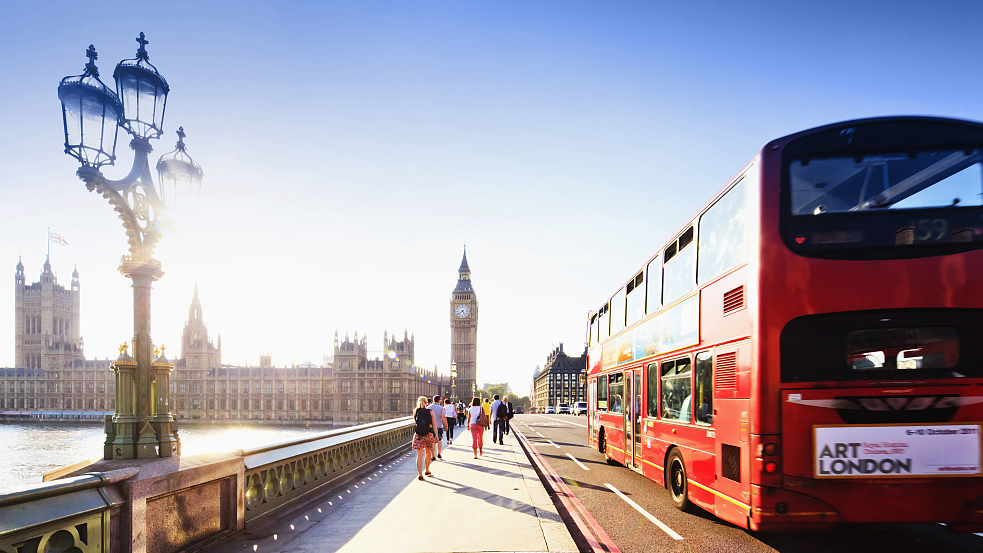
(Photo: CGTN)
As the contest to decide who will become the next leader of the UK's governing Conservative Party and, therefore, prime minister continues, it is becoming increasingly clear that the victor's government may struggle to last longer than a few months at most.
While all attention is currently being paid to the plans and policies of Boris Johnson and Jeremy Hunt, how long are they actually likely to remain as prime minister?
The position of the governing Conservative Party has been perilous since the general election called by Theresa May in 2017, in which no single party was able to win a majority of seats in the House of Commons.
This meant that the Conservatives had to strike a "confidence and supply" deal with the Northern Irish Democratic Unionist Party (DUP) in order to be able to govern.
The government's position has become even more precarious since then. Four members of the Conservatives have left their party, principally regarding policy disagreements over Brexit, and the arrangements with the DUP have become increasingly fraught for similar reasons.
If we include DUP votes, the government currently only has a working majority of five MPs in the Commons. This could be about to get worse as a by-election has been called in Conservative MP Chris Davies' constituency after he lost a "recall petition" that was triggered when he was found guilty of fraudulently claiming MP expenses.
In a somewhat perplexing move, the Conservatives have chosen to reselect Davies as their candidate in the by-election despite his association with this offence and the almost certain anger that this has caused among his constituents. Liberal Democrats previously held the seat, and it currently appears very likely that they could retake it. This would bring the government's working majority down to only three MPs.
Theoretically, this is still enough for the government to be able to function. However, it requires every single Conservative and DUP MP to vote with the government – provided no opposition MPs choose to vote with the government. This means that every single vote going through the Commons is on a knife-edge for the government; all it would potentially take to cause a defeat would be for two Conservative MPs to rebel.
The danger for the government here is accentuated even further when we consider the immense controversy of the Brexit issue that is likely to still dominate Parliamentary business in the coming months. Multiple Conservative MPs highlighted it recently, making public their intention to vote against the government in a "confidence motion" if the government were to pursue a no-deal Brexit.
A confidence motion, if lost, is capable of bringing down the government and triggering a general election. There is already talk that opposition MPs may try to bring such a motion on the very first day of the new PM's term, particularly if it is Boris Johnson who wins the Conservative leadership contest, as is currently expected.
It seems probable that the government would survive such an early confidence motion, as its own MPs will likely not have any reason to rebel at this point. However, if a no-deal Brexit becomes the stated policy aim of the government (which both Johnson and Hunt appear to have committed to if they cannot get the deal they want from Brussels), the government could be brought down very quickly.
At this point, it seems extremely unlikely that the Conservatives would be able to win a majority in any general election if they have not yet delivered Brexit. This is because the Brexit Party is almost certain to steal large numbers of Conservative votes, making it that much harder for the Tories to win marginal seats.
That said, depending on the position they eventually adopt on Brexit, the main opposition Labour Party may also lose votes to the Liberal Democrats, meaning they too might not be able to form a majority government.
Based on current polling, however, it seems most likely that a "progressive coalition" between Labour, the Liberal Democrats, and perhaps the Scottish and Welsh nationalist parties, could be the most likely eventuality in Britain's new divided, multi-party politics.
What seems very unlikely, however, is that the next Conservative PM will survive long if they pursue the Brexit policies they currently advocate.
There are enough MPs in their own party to bring them down, and in the resultant election almost certain to occur before Brexit is implemented, the party could well be annihilated by the Brexit Party, ensuring that the new Prime Minister has no chance of being returned to power.
In this way, whether it is Johnson or Hunt that wins, they may not be around as prime minister for very long.


